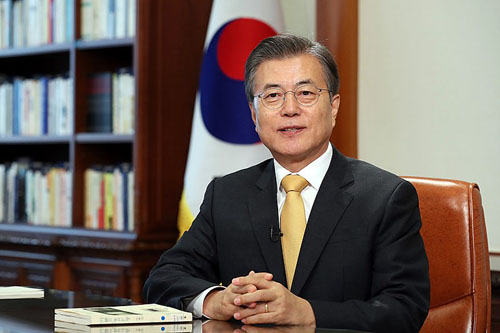by WorldTribune Staff, August 26, 2019
Even South Korea’s “mainstream media” which has largely ignored a populist conservative revolt against President Moon Jae-In are reporting that he has squandered his political capital.
The number of South Koreans who disapprove of his performance has exceeded 50 percent for the first time since he took office in May 2017, according to the latest Realmeter survey.

Some analysts say the South Korea public has had enough of Moon’s pro-North Korea policies, particularly since the Kim Jong-Un regime in Pyongyang has continued its provocations with missile tests.
“Moon’s recent call for a ‘peace economy’ ” with the North, “has given the impression that he is out of touch with reality,” the Korea Times said.
The survey published on Aug. 26 showed that 50.4 percent of respondents thought Moon was doing a bad job, a 4.1 percent increase from the previous week.
According to Realmeter, a prime reason for Moon’s waning approval numbers is the escalating political scandal involving one of his top aides, Cho Kuk.
“The rising negative assessment of Moon was seen in most age groups and even in regions that have been a stronghold of the ruling party,” the Korea Times reported. “In particular, the scandal has affected the sentiment of people in their 20s who have supported the president’s vision for reform of society by promoting equality and transparency in all sectors, particularly the judiciary.”
Cho is Moon’s nominee for Justice Minister. The JoongAng Ilbo reported that more than half of all Koreans oppose Cho’s nomination.
The South’s rival parties agreed to hold a two-day confirmation hearing from Sept. 2 for Cho, who is at the center of a widening scandal over allegations of corruption and unethical behavior involving himself and his family members.
Amid the Cho scandal, Moon’s recent decision to pull out of a military intelligence-sharing pact with Japan was slammed by the United States and Japan as well as opposition parties in South Korea.
Related: Seoul scraps intelligence-sharing pact with Tokyo in blow to U.S. alliance, August 23, 2019
Some in opposition parties say that Moon was trying to draw attention away from the Cho scandal with the surprise announcement on the intel-sharing pact with Japan.
Moon’s withdrawal from the General Security of Military Information Agreement (GSOMIA) “has sparked widespread concerns of weakened trilateral security cooperation amid continued North Korean military threats by ending the agreement that was signed at the initiative of the U.S. in 2016, and renewed every year since with the mutual belief that it contributes to maintaining regional peace,” the Korea Times said.
While openly expressing its displeasure at the GSOMIA withdrawal, the Trump administration is also pressuring Seoul to increase its share of the cost of maintaining U.S. troops in South Korea.
Earlier this month, a North Korean propaganda outlet had called on South Korea to abandon the intel-sharing pact with Japan that was signed under former South Korean President Park Geun-Hye, Geostrategy-Direct reported on Aug. 6.
A large number of protesters called for Moon to resign at a massive flag rally in Seoul on Aug. 15 to mark the 74th anniversary of Korea’s liberation from Japan, WorldTribune.com reported.
“People held South Korean flags (Taegukgi), the U.S. flags (Seongjogi), and the Israeli flags. Many called for Moon Jae-In to step down; some went further to demand Moon’s impeachment or drive him out from the office,” East Asia Research Center reported on the Aug. 15 rally.
As for the ongoing Cho scandal, Dr. Tara O, Director at East Asia Research Center and a Lieutenant Colonel in the U.S. Air Force (Ret.), tweeted: “Cho Kuk was a mber of Sanomaeng (Socialist Workers League of Korea). Its goal was to overthrow #SouthKorean system for workers’ socialist revolution by armed uprising. Cho said he’s not ashamed of it. Moon designated Cho to be the Justice Minister.”
According to the Korea Times, it is alleged that Cho’s 28-year-old daughter “received preferential treatment over college admission through a controversial academic paper she was credited with as a lead author, despite only being in high school. She also was given 12 million won ($9,930) in scholarships for six straight semesters from 2016 to 2018 while attending the medical school at Pusan National University, although she flunked courses twice.”
Intelligence Brief __________ Replace The Media
